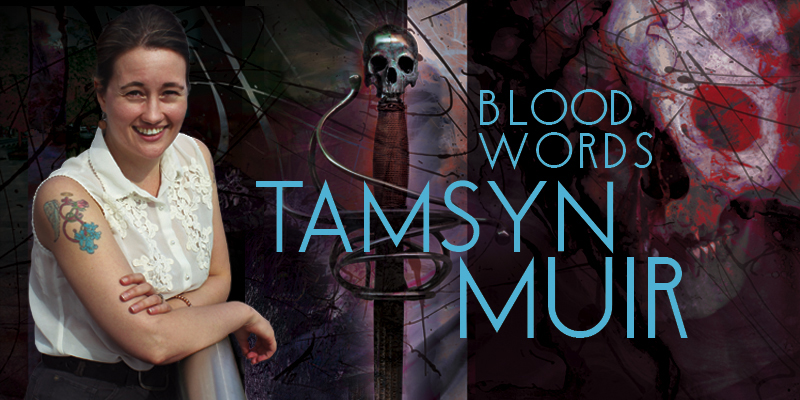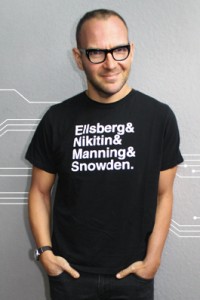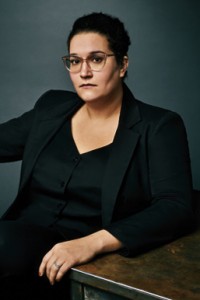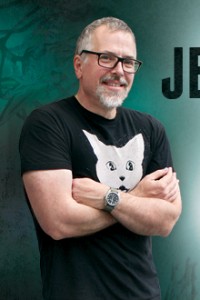Tamsyn Muir: Blood Words

Tamsyn Elizabeth Muir was born March 14, 1985 in New South Wales, Australia, and relocated to New Zealand when she was nine months old; she grew up in the small town of Howick, outside Auckland, and considers herself a Kiwi. She has also lived in Waiuku and central Wellington. Muir finished school at 16 and attended university briefly before dropping out. After working in retail for two years, she earned an education degree in 2010, and has since taught both English and English as a secondary language.
She attended the Clarion Writers Workshop in 2010, and debut story “The House That Made the Sixteen Loops of Time” appeared in 2011. She has published a handful of other stories, including Shirley Jackson Award finalist “The Magician’s Apprentice” (2012) and World Fantasy and Nebula Award finalist “The Deepwater Bride” (2015).
Debut novel Gideon the Ninth appeared in 2019, and won the Crawford Award for best first fantasy; it is currently a Nebula Award finalist. The second book in the Locked Tomb trilogy, Harrow the Ninth is forthcoming in June 2020, with Alecto the Ninth expected in 2021.
Muir lives in Oxford, England.
Excerpts from the interview:
“I read everything I could get my hands on – sometimes in a good way, sometimes in a bad way. Keep in mind that New Zealand in the ’90s was about 20 years behind everyone else, so I was reading a lot of 1950s kids’ fiction, like Enid Blyton. I read a lot of New Zealand fantasy and kids’ books too, which are all universally weird. Authors like Margaret Mahy – who kind of came over to America but isn’t a household name – and Maurice Gee, who definitely isn’t an American household name but is in New Zealand. I read Stephen King way earlier than I should have. I read my brother’s Images of War magazines, a lot of old-school science fiction, and a lot of comics.
“My mum was a librarian, so reading books wasn’t optional. She would come home with an armful of books and go, ‘I need these reviewed! Read this and tell me what you think.’ I read a lot of what we’d call young adult now – stories for early teenagers about issues of our time. ‘Ah, anorexia, an issue of our time,’ or, ‘Here is a story about the sad summer when my mother died.’ Lots of really depressing young-adult stuff, all for my mother. She never thanked me. She would not be able to pay the invoice. My time is worth a lot more than what she wasted.
“There was also really good stuff. I read the Animorphs series, of which there are only about nine million books, and that was my first big introduction to modern sci-fi. It’s a long series about five teenagers who can turn into animals, which sounds lame as hell, but it was surprisingly dark. It’s kind of a cult sleeper hit now, and I loved every moment.
“I got into Harry Potter late, because I was reading Animorphs instead. I thought, ‘Oh, this boy at wizard school, that’s dumb. There’s nowhere for that to go.’ I did eventually read it, and loved it, like everybody else. My reading history was catholic. I’m grateful for that now, even if my mum owes me a lot of money. I got into thick epic fantasy – David Eddings, the Wheel of Time, Lord of the Rings. Doorstopper stuff. I wasn’t an extra in the Lord of the Rings movies. I could have been, if I could ride a horse. I was just gutted. I was an extra in a lot of New Zealand TV stuff growing up, like our longrunning soap opera Shortland Street. In New Zealand if you work in the extra business, you’ve been an extra in everything. Nepotism got me into that business. A relative worked in casting, so she would say, ‘We need a bunch of people for a shot on the street, can you go?’ What characterizes me is doing what my family said, all throughout my entire childhood, and not getting extra pay for it. I think my family should be in hock to me for the next 50 years.
“One of my earliest memories is writing on Post-it notes. I wrote a lot of fan fiction, though I didn’t know it was called that at the time. I’d read a book or watch a show, and I’d want to write about the main character dying horribly. Not in a horror way – I wanted it to be very sad. They’d die in a really banal way, like being hit by a car. I’d write at least five Post-it notes of agonizing death, and that continued up to my teenage years, when I found fan fiction for real and posted stories for fun on the internet. That was great, because the internet is so mean, you’re going to get honest feedback about
anything you write. Writing and reading came hand in hand for me, because I’d read, synthesize it into somebody getting hit by a car, and write about that. I just continued from there.
“I started taking writing seriously in 2010, when I was 25. That was the year I attended Clarion in San Diego. That workshop was incredible, and the best thing it did was make me take writing seriously and think, ‘I can do this as a career!’ I come from a big family, and we’re diaspora. My mother always had very specific ideas about jobs all of us should do. My two eldest sisters went into secretarial work to start with, though my second sister went back to uni when she became a mum because she’s hard core. My brother was always going to be a lawyer. I was always told I was going to be a teacher, so I became a teacher. My mum’s dad had been a blue-collar railroad man but her grandmother had been a teacher and that was the family dream. ‘Writer’ was not an option. Only my littlest brother got left out of it – he could do whatever he wanted, so what he did was get good enough at Halo to play in national Halo tournaments. In my opinion, he is one of our proudest achievements as a family, and I mean that sincerely. He’s so chill and everyone playing Halo is so mean.
“It’s a huge commitment to go to Clarion. From New Zealand, that’s a long flight, like 19 hours. I’d had a couple of mates who went to Clarion, and the year I went, it was particularly star-studded. George R.R. Martin was there, Ellen Kushner, Delia Sherman. I love Ellen Kushner’s Swordspoint to death. It wasn’t an inspiration in terms of aesthetics or feeling, but absolutely in queerness. Love all the swords details, love all the jewels. It would make perfect sense if somebody looked at the DNA of Gideon the Ninth and thought I reread Swordspoint just before. I didn’t, but I have always loved it. I didn’t know Jeff VanderMeer well at the time, but he’s massive now. Chip Delany! A really great lineup, though I didn’t quite understand how big any of them were, and I didn’t understand the industry. I’d just finished my teacher’s training degree, so Clarion was my last fling. I was going into my first teaching job, but first I was going to do this stupid writer’s thing, just for me. I wanted to be Tamsyn Muir, the writer, one last time. I didn’t really think, even going to Clarion, that I’d ever make it as a writer. To me it being a writer was a starving artist in a garret thing – it wasn’t a real job.
“When I was at Clarion I realized, ‘Oh, you can actually do this as a career even if you’re working some other job. You can write short stories.’ That seemed low stakes. I could try to sell short stories while working a day job and living respectably. That was the start of me thinking this was a viable career you could get paid dollars for – especially in New Zealand, because the US dollar was massive. Every time I got a US paycheck, I was like, ‘Whoah, I’m rich. I didn’t know anybody would pay me for writing!’ There are New Zealand markets, and I’m not going to be unkind about them, but they’re very small, and after Clarion I wanted to go pro. I wanted eight cents a word – that was hot stuff. Venally, I wanted the sweet American dollars. I was looking at it like a side hustle, not artistically, or even as a future career. It was just a nice thing to do on the summer holidays.
“I was nervous about going to Clarion, because I thought that everybody else there would have been following science fiction/fantasy since 1920, and know the names of obscure short stories – and they did – but in fact everybody was nice about it. We were all coming from different places, but everybody wanted the same thing. It was great, being around other people who had come from their day jobs to be writers, because none of them were writing full time. I think the most star-studded member was Gregory Bossert, who had sold two stories already. We were like, ‘Whoa, Greg, what are you doing here?’ He’s amazing.
“I had to take writing seriously after Clarion. I’d only ever written Post-it epics about people getting hit by cars. I had to dump everything I knew about character; I started writing just for structure and plot, and got excited about that. I was using a totally different skillset. I sucked, and I wasn’t used to sucking so badly at writing. I had to look at the story as a piece of art, technical art, and that was really fun and it felt good. I finished three short stories at Clarion, and sold one right after, to Fantasy Magazine.
“Jeff & Ann VanderMeer were hugely influential to me not simply as writers in the craft and editing, but also in selling your stuff, putting yourself out there, and getting rejections. I had no interest in getting rejected anymore after flunking out of university, but having a story accepted and sold felt so massive. Even my family was like, ‘Whoa, people are going to pay you for this kind of thing?’ My older brother supported my writing even in the days of Post-it notes, and paid for me to go to Clarion. He was working as a Customs officer at the time so it wasn’t like he had a lot of money to play with. Such an incredible human being. All he told me the rest of the time was, ‘You’re terrible, you suck, what a wretched human being you are, I’m so sorry you’re my sister,’ but he thought I was talented, and he paid for me to go to Clarion. I think I’ve dedicated pretty much every story to him. Mainly to embarrass him. He always took me seriously; I started to take myself seriously when I thought, ‘Now I have to pay him back.’
“My parents have always been supportive, but they did not think writing was a real career. And I mean, fair enough. My brother was the first one in our family to go to university. In my family, the emphasis was always on, ‘Get a real job, get a degree, that is the path to happiness.’ Once you do that, then you’re set up for life. Even though I didn’t really want to become a teacher, my mother was like, ‘You can take it anywhere – go get a teaching degree.’ Because I had flunked out of university, it felt pretty cool to get a degree. I thought, ‘I can inspire kids who aren’t perfect.’ I had a lot of fun during my teaching time. Their writing is always hilarious. There is nothing so original or weird as a bunch of 14-year-olds doing creative writing.
“Mum and Dad viewed writing as my cute side hobby until I sold my novel. They were excited, but that was the first time they realized how serious I was. Because I was always a very secretive child, I didn’t show them my writing at all. Only now have they said, ‘Oh, so this is the career you wanted?’
“Gideon the Ninth is this big, lesbian book, and for anybody with a big family, no matter how supportive they are of you being out, and no matter how supportive they might be of LGBTQ issues, it’s difficult – and everybody’s family is difficult in a different way. I had dreams that Mum and Dad wouldn’t even read it. I could just say, ‘I’ve sold a book, please don’t Google it, please don’t read it, please don’t look at it. Never read it, and don’t let anybody in the family read it.’ My dad found some of the stuff online; there are chapters posted. ‘Okay, my 76-year-old dad is going to read my lesbian fantasy book.’ He was sweet and kind and enthusiastic and intelligent about it in a way that made me have a little meltdown. Like, ‘Oh, I could have been interacting with my parents this way for years’ – it’s not that I didn’t trust them, but writing was my secret bad place thing.”
Interview design by Francesca Myman. Photo by Arley Sorg.
Read the full interview in the April 2020 issue of Locus.
 While you are here, please take a moment to support Locus with a one-time or recurring donation. We rely on reader donations to keep the magazine and site going, and would like to keep the site paywall free, but WE NEED YOUR FINANCIAL SUPPORT to continue quality coverage of the science fiction and fantasy field.
While you are here, please take a moment to support Locus with a one-time or recurring donation. We rely on reader donations to keep the magazine and site going, and would like to keep the site paywall free, but WE NEED YOUR FINANCIAL SUPPORT to continue quality coverage of the science fiction and fantasy field.








That was an incredibly inspiring story! Now I’m going to dust myself off and submit another short story. Gunning for those 8 cents/word :D.